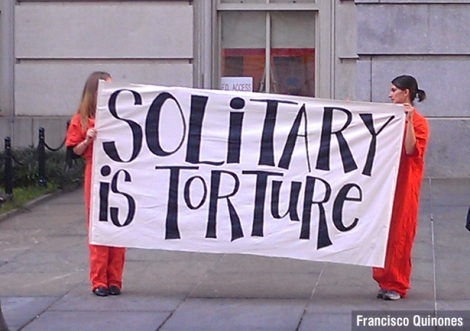‘The slow descent of sane men into madness.’
I read this statement in William Blake’s essay on Solitary Confinement yesterday and it had a bearing on me; this whole concept of imprisonment in which a person is isolated from any human contact except for the members of the prison staff in some cases. The more I read, the more I could visualize happening right in front of me or with me. What they do is- they lock you down, literally in a closed window-less cell which is so small that you can touch the side walls on extending your hands. There is a small slot in the cell from which some prison guard can enter an unsavoury meal thrice a day; so that is when you can see a hand, a human hand. A prisoner spends twenty-three hours each day in this cell while the remaining one hour is termed as the time for recreational activity wherein he/she is brought out in a yard, slightly larger than the cell with essentially no means of recreation. So even this yard doesn’t have a television or a cell-phone or a game or even a single other human. If you’re lucky enough, you can catch a glimpse of the sky through this enclosure. At least that ways you can form the belief of being out in the open.
A solitary confinement unit has different names in different regions. People call it the hotbox or the hole or the lock-down or the Special Handling Unit (SHU). According to an article published in The Guardian in 2012, approximately 80,000 prisoners are held in solitary confinement in the United States presently. A large number of these people are mentally ill or have some underlying psychiatric disability. Additionally, most of the ones who are sane are driven into madness and insanity by the detention and isolation. Now, you know why Blake called it- ‘The slow descent of sane men into madness’ and sometimes it is not even slow. The prisoners are away from the world that really exists. Nothing happens to tell them whether it is a Monday or a Friday. Blake testifies how he is so unaware of things that are present outside his SHU. He has been there for about twenty-six years and he has never seen or operated a computer except for gazing at its images in some magazines. He is oblivious of the technological advances or the fashion on the streets. What he and the other prisoners recognize and endure is ‘torture’; a life worse than death. Many yell and scream in desperation, cut themselves, try to commit suicide and utter the filthiest of words that a person can rarely think of. The only human emotion that permanently subsists is that of Misery.
This entire idea of solitary confinement makes me reflect on the meaning of boredom. Do you know what monotony means? No, you don’t. What normal people call boredom seems like a tornado of activities for Blake. You and I have got so many choices. If you’re bored, you can pick up the phone and call a friend; you can watch the television, play a game on the laptop, go out for a walk, use the internet; in most instances, you can converse. That’s not boredom, that’s the sentiment or condition of having so many options to do something that you’re stuck with doing nothing. Life is different when you’re in that box and you can’t handle the pressure that it exerts on your mind. According to Blake and many others, it is sadder to see the spirit shaken from the soul. Reports assert that the victims of this form of punishment end up having visual and auditory hallucinations, insomnia, paranoia, uncontrollable feeling of rage and fear, distortion of time and perception etc.
A comprehensive report at MotherJones.com talks about Herman Wallace and Albert Woodfox who have been in solitary confinement for forty years. They were thrown into the hole on April, 17, 1972. Some human rights organizations are fighting for their rights and petitions are being signed by millions to release them from these units and rather shift them to ordinary prisons.
Across the United States and the World, movements are emerging to bring an end to solitary confinement which is plainly a violation of the basic human rights. In 2011, prisoners across California organized two hunger strikes in protest of the ruthless conditions of confinement. The California Department of Corrections and Rehabilitation (CDCR) persuaded the prisoners to shelve the strike by promising adjustments but responded by punishing the hunger strike leaders. There are unions and committees fighting for liberation, for humanity and for a life for the ones who are suffering at the perils of this confinement. The United Nations categorize it under the acts of infringing human rights and people are standing up for the cause because they realize how derogatory this retribution has become over the years. Spread the movement and the stories about solitary confinement and sign petitions if they are put across. To read more accounts, you can have a look at Solitary Watch which gathers the news from a nation under lock-down.
So, next time when you’re by yourself or bored, think about what you just read. Your life is a lot better than thousands out there.
References: Solitary Watch, The Guardian, Wikipedia, Mother Jones, Centre for Constitutional Rights, American Friends Service Committee, American Civil Liberties Union etc.


